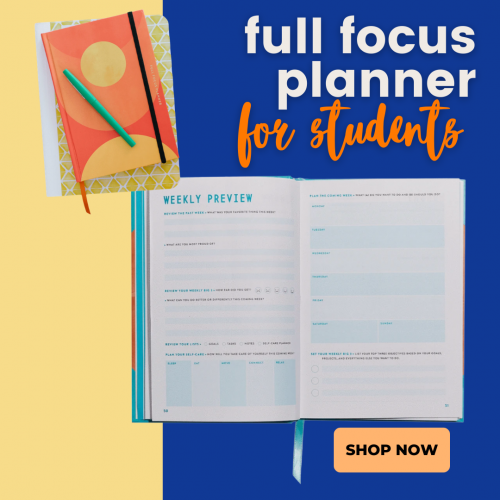
Table of Contents
The first step to get ready for college is getting organized. Suppose you have impressive grades and test scores but don’t have a plan or process for finding colleges, applying to college, or navigating the financial aid process. In that case, you’re going to struggle with overwhelm and confusion. This post will walk you through tools and systems to help you organize your process from top to bottom and position you as a more competitive candidate.
When Building Your College List
When you get ready for college, an important step is to build a college list. Your goal is to find colleges that fit you best. Don’t make the mistake of choosing the wrong college for you. If the school does not offer your major or resources that will support your needs, you risk dropping out or transferring to another college. Avoid this costly mistake and take the time to research colleges ahead of time. While it’s tempting to get a list of colleges from friends, don’t fall for it. A college that may work for them may not be best for you.
To find your best college, you must do some research. It’s the most important step in the college admissions and financial aid process. It determines where you apply, who admits you, and the price you pay for college.
Use the College Exploration Worksheet to help you answer the questions you have about potential colleges and compare them. The answers will give you critical insight and help you build a balanced college list that meets your needs and speaks to what matters most to you. Download it here.
When Networking with Admissions Officers
As you get ready for college, you’ll need to network with admissions officers. A few weeks ago, I wrote a post on how to nail a virtual college fair. The post includes practical tips about interacting with admissions officers and questions to ask and a template for an introductory email. Read it here.
Over the next few months, make sure admissions officers at your top choice schools know, like, and trust that you are a good fit for the school. Admissions officers are part of a committee and must spend time reading your application. When deciding who to admit, the admissions officer will present you to the committee for a vote.
When Applying to College
Getting focused and avoiding procrastination. Created by productivity guru Michael Hyatt, I use the professional version to balance everything I have going on with work, family, kids, and business. But Mr. Hyatt has a phenomenal version for high school and college students as well. You have plenty of things going on in your life. When you get ready for college, you want to focus on the RIGHT tasks. I encourage all of my students to use the Full Focus Planner. Buy it for $29.99 here.
Keeping track of applications. I created this tool for you to manage your college applications. If you’re applying to dozens of colleges, the requirements, due dates, and steps will be different for each. This tool will help you keep it all organized and stored on your Google Drive to access anywhere you are. Once you sign up for Common App or Coalition Application, transfer deadlines and requirements for each school into your college tracker spreadsheet. Also, devote a tab to storing passwords for your college site like the College Board, Common App, Coalition App, ACT, FAFSA, and so on. It can be hard to keep up with so many log-ins, so having them stored when you need them. My favorite tool to use is Google Sheets. In the next section, I will describe how to use Google Drive to organize your college application materials. Download the Application Tracker here.
Proofreading and editing essays. Grammarly is a powerful artificial intelligence tool and is the best resource on the market to help your writing be clearer to the reader. The average admissions officer will only spend 5-6 minutes looking at your essay. If it’s hard to read, confusing, and riddled with grammar issues, you diminish your admissions chances. In How AI Can Make Your Admissions Essay Harvard Ready, Geoff Cook analyzes over 100 Harvard and Yale essays. The author presents interesting and entertaining metrics to show why you must use Grammarly before submitting your college essay. Grammarly will help you use correct spelling and grammar, keep your audience engaged, and strike the right balance of unique words and phrases. Use this link to access the free version of Grammarly.
Creating a winning resume. While often seen as optional, a resume is becoming more of a necessity. Also, let’s say the college says “optional” for any document in its application. In that case, it’s really required and will show you’re one of the more motivated students. It’s a one-page snapshot of your academic profile, work experience, extracurricular activities, awards, and interest. Read this post on why every high school student needs a resume and download free templates.
Getting the best recommendation letters. When you’re ready to ask your teacher for a recommendation letter, don’t do so empty-handed. Give them your resume and Student Brag Sheet to guide them on what to include in your letter of recommendation. College recommendation letters are important in the college admissions process. The recommendation letter provides social proof or verification of the information you provide in your college application. Also, the college recommendation letter gives dimension to your high school academic record. A good recommendation letter can strengthen your application (it won’t be the sole reason a student is admitted). However, a poor recommendation letter can almost certainly ruin your chances of admission. Therefore, it’s important to ask the right person to write a recommendation letter as well. Read this post to learn more about recommendation letters and download a brag sheet.
Storing application materials. Many students work on applications while at school or home. If you want easy access to your application materials, you can use a cloud drive wherever you go. My favorite, and one you are likely most familiar with, is Google Drive. Create a “College Application” folder as your master folder. In this folder, store your general college essay, resume, and brag sheet. Also, keep sub-folders for each college you’ll be applying to. In the sub-folders, you will store supplemental essays and other supporting documents. What’s great about this system is that you can link folders and documents to the College Tracker (saved as a Google Sheet) for easy retrievals, such as essays and your resume. As a bonus, you can upload essays written in Google Docs directly into your Common App essay section. The same is true for other parts of the Common App that require an upload.
Having a professional email address. You will need to manage communications between you and the college office. Email is the primary way that college officers will communicate with you. Make sure that you create and provide colleges with a professional email address, such as first.lastname@domain.com. Ideally, this account would be separate from the one that you use for your personal life. Make sure that you check the email account every day to respond to time-sensitive emails. If there is a request that you do not understand, ask a parent or guidance counselor for help.
Keep every email you get from a college. To help you organize your inbox, I recommend that you label and sort emails by colleges so that you maintain a record of communication. You never know when you may need to refer back to an email.
Conclusion + Next Steps
In this post, I reviewed how you can get organized for the college admissions process. Make sure that you access all tools discussed so that you have everything you need to achieve success in the college admissions process. Also, check out this post for the 7 Steps to Creating a Stand Out Application.







